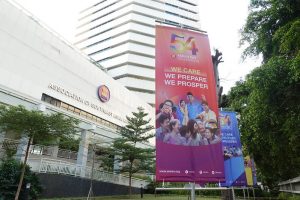ASEAN’s newly appointed special envoy to Myanmar says he is still negotiating with the military government over the timing and scope of his inaugural mission to the crisis-hit country. In an interview with Reuters on Saturday, Erywan Yusof, Brunei’s second minister for foreign affairs, said he wants to visit before the ASEAN Summit in late October, but that no date has been finalized.
“They haven’t put a condition yet but they haven’t been clear about it,” Erywan told the news agency. “There is an urgent need to go now to Myanmar. But I think before all that, I need to have assurances,” he added. “I need to be able to have a clear picture of what I’m supposed to do, what they are going to allow me to do when I visit.”
Erywan was appointed by the Southeast Asian bloc as its special envoy during the 54th ASEAN Foreign Ministers’ Meeting last month. The appointment of an envoy was one of the five points of consensus reached at a special ASEAN Leaders’ Summit that was convened on April 24 to address the turmoil that has gripped Myanmar since the military’s coup in February. Among other things, the ASEAN Five-Point Consensus called for the “immediate cessation of violence” in Myanmar and “constructive dialogue among all parties concerned to commence to seek a peaceful solution.”
In order to foster dialogue “among all parties,” Erywan also repeated to Reuters an earlier promise that he would seek a meeting with ousted leader Aung San Suu Kyi, and that a request had been submitted to the junta to this end. “That’s the thing that I have been saying to the current authorities in Myanmar, I need to talk to all the parties concerned and that’s still under negotiation,” Erywan told Reuters.
In a separate interview on Saturday with Kyodo News online, Erywan said that he had proposed a cease-fire until the end of this year in order to permit the distribution of humanitarian aid via the ASEAN Coordinating Centre for Humanitarian Assistance – another of ASEAN’s five points of consensus. He said that he proposed the ceasefire to the military-appointed foreign minister, Wunna Maung Lwin, during a video call last Tuesday, and that he had been receptive to the idea.
“They didn’t have any disagreement with what I said, with regards to the ceasefire,” the envoy told the Japanese news agency, adding that he has also passed his proposal indirectly to parties opposed to the junta. He also said that ASEAN had prepared its first batch of aid to Myanmar, which consists of medical equipment such as oxygen compressors and protective gear that will help the country stave off its current outbreak of COVID-19, though he did not mention when it might be dispatched.
In handing Erywan the duty of opening a peaceful dialogue between the military junta and its various opponents, however, ASEAN has saddled him with an unenviable and fiendishly complex task. As I’ve noted previously, there are many reasons to be skeptical of ASEAN’s approach to the coup and the political turmoil that has taken place in the seven months since – and it is clear that some of the region’s more authoritarian governments would prefer not to set a precedent of strong intervention in member states’ internal affairs.
But any criticism of ASEAN’s inability to resolve the crisis has to be accompanied by a recognition of the intractable trajectory of the country’s crisis. This is increasingly taking the shape of a zero-sum struggle, in which neither the junta nor its opponents have shown any reason or inclination to compromise.
The complications involved in simply organizing a trip, and the necessity of gaining the junta’s consent for meetings with any members of the anti-coup opposition, demonstrate the extent of the challenge. As it stands, there is every chance that Erywan will be unable to achieve much before ASEAN’s rotating chairmanship passes to Cambodia at the end of this year. (I have been unable to determine whether Erywan will continue to hold the post of special envoy, or whether Cambodia will be responsible for appointing a replacement who will serve in the role for 2022.)
In the end, while it is clear that ASEAN can play an important role in facilitating humanitarian aid and attempting to bring the two warring factions to the table, the success of its mission – or its failure – will depend overwhelmingly on the political temperature inside the country.

































